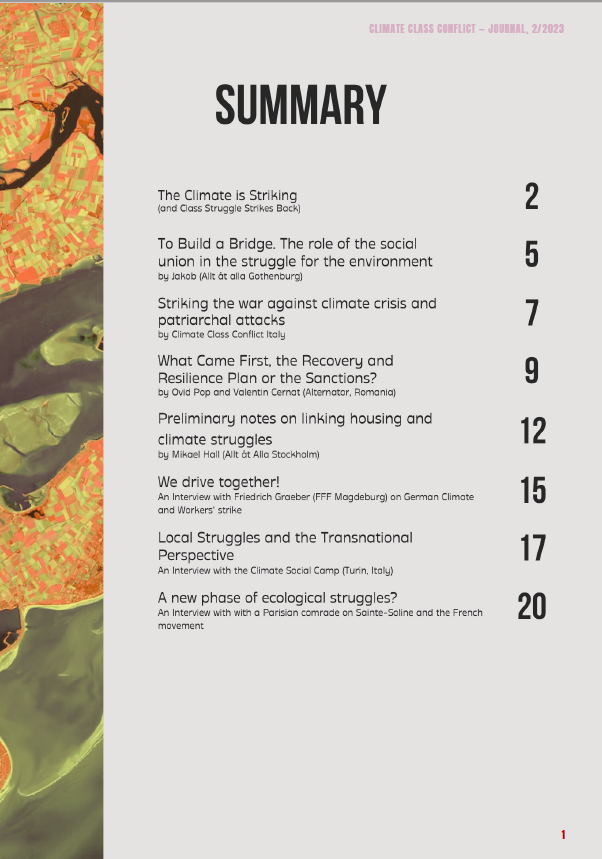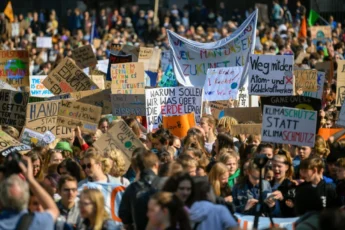
by CLIMATE CLASS CONFLICT
We publish the introduction to the second issue of the Climate Class Conflict journal “The Climate is Striking. And Class War is Striking Back”.
This issue is the result of an ongoing reflection on what it means for us to take a climate class stance in these struggles, on how we can contribute to stretch their limits and build a space for transnational communication that can strengthen our collective claims. The TSS initiative Climate Class Conflict has been the attempt to practice this political communication since our meeting in Sofia in September 2022. It went through the publication of our first issue of this journal – For a Climate Class Conflict. Strike the Green Transition! – and was widely discussed in Frankfurt last February. On all these occasions, we acknowledge that not only struggles do not appear everywhere at the same time with the same intensity, but also that they do not always take the shape we may expect. Despite its centrality for changing dynamics in both production and social reproduction from Western to Eastern Europe and beyond, the capitalist green transition does not always appear as the main target of social unrest. Still, the effects of the green transition materially connect individuals in different social positions and in disparate national contexts. Social struggles can thus gain strength and capacity to expand by the attempt to bridge social and climate justice demands. How can we make these resonances visible and lasting? How can we build a strong base for future transnational struggles? Can the green transition be a strategic field to connect our initiatives, starting from the recognition that ecological, industrial, and military investments constitute a field for capital accumulation which is finding in the current war scenario a suitable environment to flourish? Our political bet is that it can. We call climate class conflict the attempt to politicize the green transition, that is, to oppose through a common transnational struggle its devastating effects on the working and living conditions of millions of people and the way it worsens the climate crisis. A climate class conflict is what we need to envision a way out of the green transition’s unbearably capitalistic logic.
What happened in Germany in the last months, with the climate movement joining workers on the picket lines shows that – as Friedrich from Fridays For Future Marburg puts it in his interview – «climate and social justice belong together». This is telling of what a climate class struggle shall aim to: demand a radical change in society while challenging its basic pillars, such as the assumption that the transition towards a ‘greener’ configuration of capitalism would leave exploitation unchanged. To accomplish such potential, though, we must acknowledge similarities as well as differences among the contexts in which we struggle. So, in front of the possibilities opened by the presence of mass movements in some places, we also ask ourselves how to go beyond existing boundaries of social struggles, highlighting that differences in conditions pose an organizational problem to political movements. To «build a bridge», as Jakob from the Swedish social union Allt åt Alla puts it, must really be our goal and ambition, not only within struggles happening in the same territories but also across borders. In this sense, with this Journal we certainly aim to put political experiences together, but we also want to move a step towards something more. We want to highlight those hierarchies that are enhanced by national plans for green transition, placing workers in critical positions that are connected to the ones of those struggling in other countries, even though not always in a transparent way. Investments in the green transition are now one of the main terrains of capital accumulation, which also translate into plans for better integrating new sectors and national economies in the European market seeking opportunities for enlargement in troubled times. The contribution provided by Valentin and Ovid on the relation between the war and climate policies in Romania clearly highlights that the green transition is about ownership and privatizations, while it serves the needs of a «logistics of war» which runs from the Black Sea to Western Europe via the Trans-European Transport Network (TEN-T). Impoverishment and dispossession are part of the process of neoliberalization of Romanian society, and green plans aim to facilitate its synchronization with the needs of the European single market, while putting workers in a connected, although different, social position to that of others in Western countries. This shows that what happens in Eastern Europe is part and parcel of one capitalist system that organize its value chains transnationally. But also, this calls on our side for the articulation of discourses and tools which can efficiently face this fragmentation. This transnational situation of exploitation, war, and climate degradation demands an effort towards the construction of spaces where refusals to its alleged unquestionability can grow stronger. As made apparent by Mikael’s notes developed from discussions held at our last Tss meeting in Frankfurt, the green transition invest different fields and always grants government motivations to unequal policies. Even housing and urban struggles happening on specific territories with specific enemies to face, are clearly caught in transnational dynamics put in motion by the green transition, which does become also a possible terrain to unite our claims.
In Italy, feminist and climate movements have joined their struggles against patriarchal violence and environmental destruction under the shared claim “Strike the war!”. These movements have recognized the strike as a common practice to fight together for climate justice, against women’s oppression, and against the effects of the war in Ukraine. This has opened a space of communication and organization through criticism of the way society reproduces itself. There is a common thread that holds together discourses about Europe as a fortress of democracy and the tolerance it shows toward governments that deny women abortion rights and pass laws against LGBTQ+ people. The same thread runs through the anti-migrants’ policies to ‘protect European borders’ and the agreements EU and its member States sign with African countries to import highly polluting fossil fuels now that the war has made Russian market inaccessible. It is about the stronghold Europe has on Eastern countries to make them functional to the single market and large investments in so-called strategic sectors. We have to recognize this thread in order to make steps forward in the organization of our rage against exploitation, patriarchal and racist violence, climate devastation, and the war in Ukraine that legitimizes governments and capital to further tighten their grip on our lives and reduce the efficacy of our political initiatives.
We want to fuel a process of organization of our claims for climate and social justice into a climate class movement that can affirm our power to change society as a whole, by bridging struggles and foster new ones, by choosing to practice the transnational politics we need in a changing climate.
Since the publication of our First issue of this Journal – For a Climate Class Conflict. Strike the Green Transition! – the strike has been the tool of struggle of millions of people around Europe. In France, workers’ refusal to spend more time on exploited jobs quickly became a spark that ignited a wave of strikes against Macron’s neoliberal agenda. As a response, politicians that for months have been endangering the future of millions refusing to take steps against environmental degradation and the possible escalation of war, have deemed demonstrators irresponsible towards the future of their children [link Tss statement]. In the UK, from social workers to rail workers, from teachers to nurses went repeatedly on strike to demand higher wages in the midst of an extended crisis of social reproduction, a crisis that – for the Head of the Bank of England – should help people remember that poverty, after all, is their lot. In Germany, public sector’s and transports’ workers took to the streets together with activists and unionists to demand for better working conditions, building connections between social and climate claims that spurred bosses to contest that theirs was a ‘political’ strike, something which is illegal in the country. These experiences are telling of both worsening conditions that travel beyond borders due to governments decisions to make people pay for the increasing social costs of the war, and a spread rising rage and desire not to submit to them.
What happened in Germany in the last months, with the climate movement joining workers on the picket lines as – as Friedrich puts it in his interview – «climate and social justice belong together», is telling of what a climate class struggle shall aim to: demand a radical change in society which starts from challenging its basic pillars, like the assumption that the transition towards a ‘greener’ configuration of capitalism shall leave exploitation unchanged. To accomplish such potential, though, similarities as well as differences among the contexts in which we struggle must be acknowledged. So, in front of the possibilities opened by the presence of mass movements in some places, we also ask ourselves how to go beyond existing boundaries of social struggles, highlighting that differences in conditions pose an organizational problem to political movements. To «build a bridge», as Jakob from Swedish social union Alt at Alla puts it, must really be our goal and ambition, not only within struggles happening in the same territories, but also across borders. In this sense, with this Journal we certainly aim to put experiences of conflicts together, but we also want to move a step towards something more. We want to highlight which hierarchies are enhanced by national plans for green transition, placing workers in critical positions that are connected to the ones of those struggling in other countries, even though not always in a transparent way. Investments in the green transition are now one of the main terrains of capital accumulation, which also translate into plans for better integrating new sectors and national economies in the European market seeking opportunities for enlargement in troubled times. From the contribution provided by Valentin and Ovid on the relation between the war and climate policies in Romania clearly emerges that the green transition is about ownership and privatizations, while it serves the needs of a «logistics of war» which runs from the Black Sea to Western European TEN-T. Impoverishment and dispossession are part of the process of neo-liberalization of Romanian society, and green plans aim to facilitate its synchronization with the needs of the European single market, while putting workers in a connected, although incomparable, social position to that of others in Western countries. Not only this shows that what happens in Eastern Europe is part and parcel of one capitalist system that organize its value chains transnationally, but it also calls on our side for the articulation of continuities in languages and tools to efficiently face this fragmentation. This transnational situation of exploitation, war, and climate degradation demands an effort towards the construction of spaces where refusals to its alleged unquestionability can resonate with each other.
We want to fuel a process of organization of our claims for climate and social justice into a climate class movement that can affirm our power to change society as a whole, by bridging struggles and foster new ones, by choosing to practice the transnational politics we need in a changing climate.






